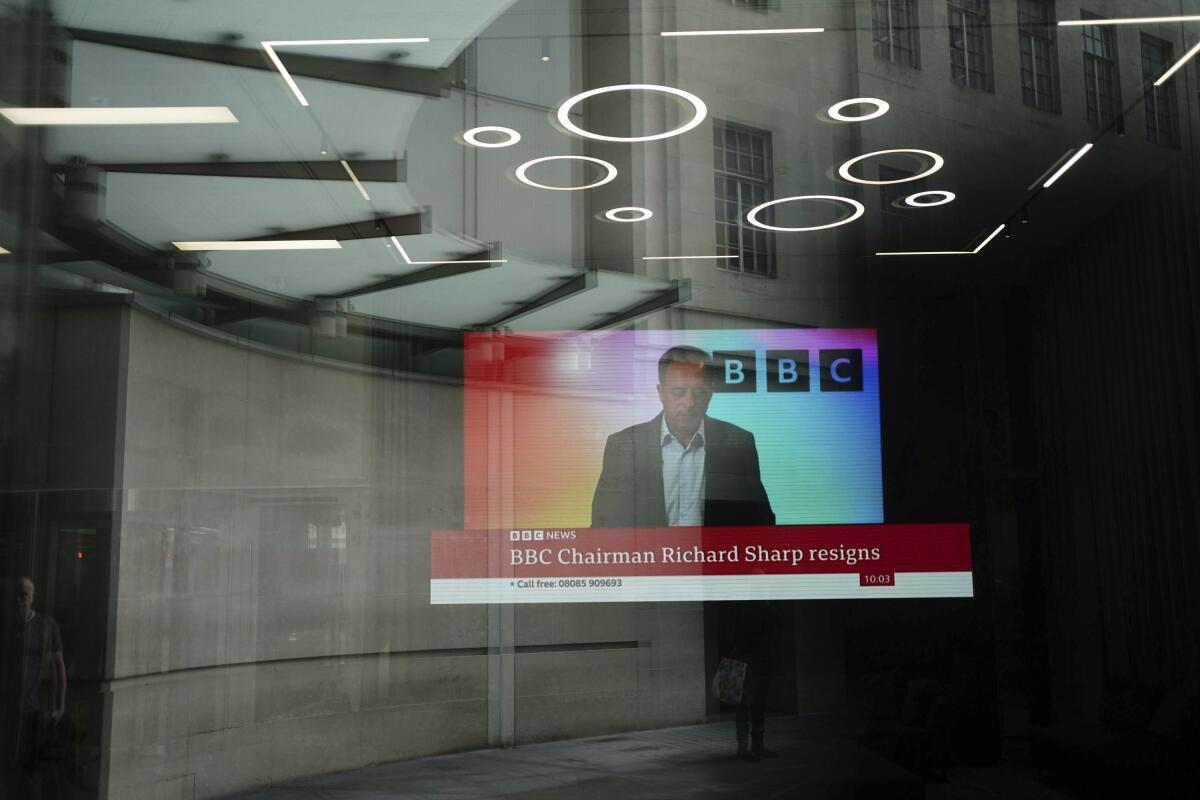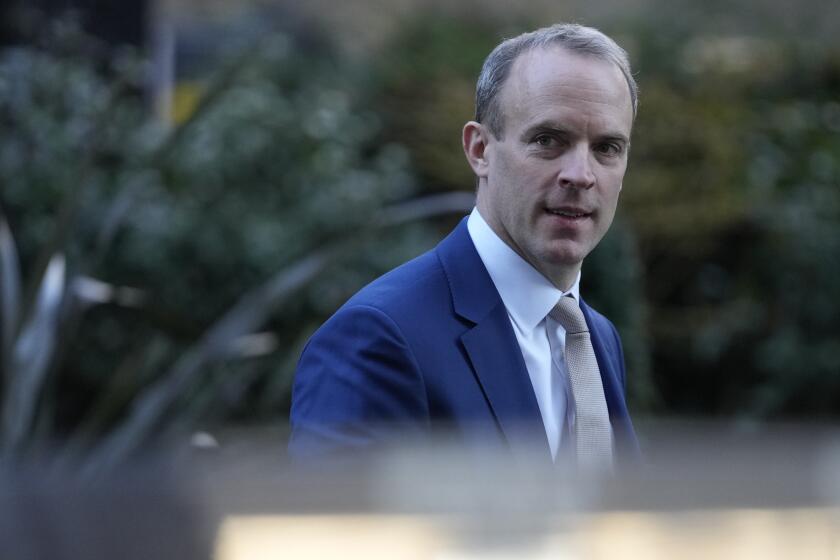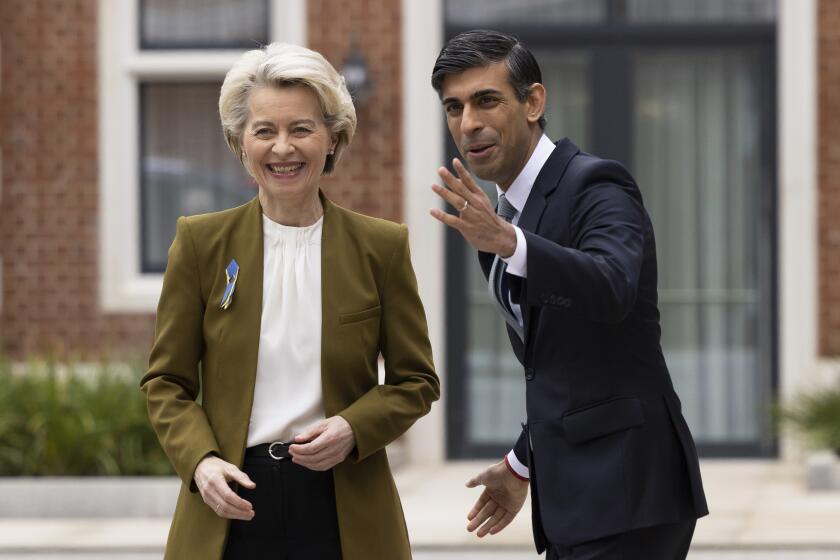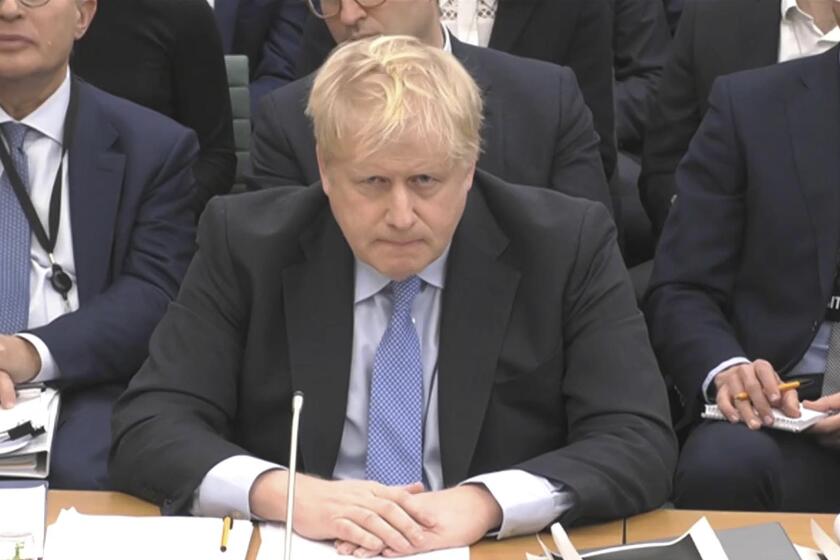BBC chief quits amid furor over role in Boris Johnson loan

- Share via
LONDON — The chairman of the BBC quit Friday after a report found he failed to disclose a potential conflict of interest over his role in arranging a loan more than two years ago for Boris Johnson, as scandals from the former prime minister’s turbulent term continue to rattle British public life.
The publicly funded national broadcaster has been under political pressure after it was revealed that Richard Sharp helped arrange the line of credit weeks before he was appointed to the BBC post on the government’s recommendation.
The $1-million line of credit came from wealthy Canadian businessman Sam Blyth, a distant cousin of Johnson’s. It was facilitated by Sharp, a former Goldman Sachs banker and Conservative Party donor, who arranged a meeting between Blyth and Britain’s top civil servant to discuss Blyth’s offer of financial help.
Johnson was then Conservative Party leader as well as British prime minister.
A report on the episode by senior lawyer Adam Heppinstall published Friday found Sharp “failed to disclose potential perceived conflicts of interest.”
The report found Sharp did not reveal his role in the loan guarantee to the BBC appointments panel before he was appointed chairman in early 2021.
Dominic Raab, Britain’s deputy prime minister, has resigned following an independent investigation into complaints that he bullied civil servants.
“There is a risk of a perception that Mr. Sharp was recommended for appointment because he assisted … the former prime minister in a private financial matter,” Heppinstall wrote in his report.
“There may well have been a risk of a perception that Mr. Sharp would not be independent from the former prime minister, if appointed,” he said.
Sharp said he would remain in his BBC role until the end of June while the search for a successor takes place. He said he made an “inadvertent” breach of the disclosure rules and was quitting to “prioritize the interests of the BBC.”
“I feel that this matter may well be a distraction from the corporation’s good work were I to remain in post until the end of my term,” he said.
Britain and the European Union finally reach a post-Brexit agreement that will allow goods to flow freely to Northern Ireland from the rest of the U.K.
Sharp is the latest in a string of politicians and officials brought down through their association with Johnson, a charismatic and chaotic politician who became prime minister in 2019 and led Britain out of the European Union the following year.
Johnson himself was forced to quit last year after a series of scandals over money, ethics and judgment became too much for his Conservative Party colleagues to bear.
While he was in office, Johnson’s financial arrangements sparked investigations into the funding of renovations to the prime minister’s official residence — known as the “cash for curtains” scandal — and into who paid for a vacation for Johnson on the Caribbean island of Mustique.
Johnson also was among dozens of people fined by police last year for attending law-breaking parties in government buildings during COVID-19 lockdowns. The “partygate” scandal helped hasten the end of his premiership.
Former U.K. Prime Minister Boris Johnson has insisted “hand on heart” that he did not lie to lawmakers about government parties during the COVID-19 pandemic.
Sharp’s resignation spares the current prime minister, Rishi Sunak, from having to decide whether to fire him. Sunak, a former banker who once worked under Sharp at Goldman Sachs, has tried to restore stability to government after three tumultuous years under Johnson and seven roller-coaster weeks under successor Liz Truss, who quit in September after her tax-slashing economic plans caused financial mayhem.
Opposition politicians accused the Conservative government of undermining the BBC’s impartiality.
“This breach has caused untold damage to the reputation of the BBC and seriously undermined its independence as a result of the Conservatives’ sleaze and cronyism,” said Lucy Powell, the opposition Labor Party’s spokeswoman on culture.
Sunak declined to comment on Sharp’s potential replacement, saying “there’s an established appointments process.”
Breaking News
Get breaking news, investigations, analysis and more signature journalism from the Los Angeles Times in your inbox.
You may occasionally receive promotional content from the Los Angeles Times.
The loan investigation is the latest uncomfortable episode for the 100-year-old BBC, which is funded by an annual $200 license fee paid by all households with a television and overseen by a board that includes BBC nominees and government appointees.
The public broadcaster has a duty to be impartial in its news coverage but is frequently a political football, with some members of the Conservative government seeing a leftist slant in its news output and some liberals accusing it of having a conservative bias.
The BBC was engulfed in a storm over free speech and political bias in March when its leading sports presenter, former England soccer player Gary Lineker, criticized the government’s immigration policy on social media.
Lineker was suspended — and then restored after other sports presenters, analysts and Premier League players boycotted the BBC airwaves in solidarity.
Lineker shared his political opinions again Friday, tweeting to almost 9 million followers: “The BBC chairman should not be selected by the government of the day. Not now, not ever.”
More to Read
Sign up for Essential California
The most important California stories and recommendations in your inbox every morning.
You may occasionally receive promotional content from the Los Angeles Times.













